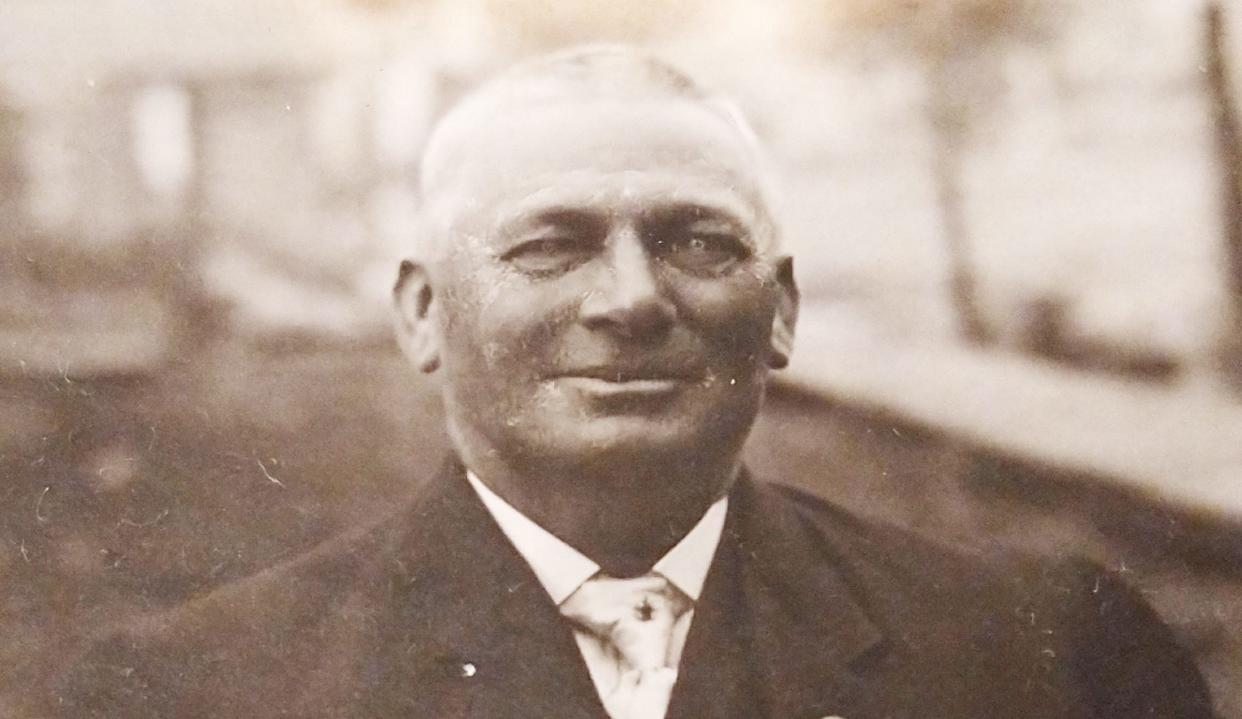Dale C. Maley: Stephen Slaughter was a Civil War veteran and early Fairbury businessman

- Oops!Something went wrong.Please try again later.
Richard Slaughter was a Civil War veteran and operated several businesses in Fairbury starting in the 1880s. Bert Slaughter, son of Richard Slaughter, also owned several Fairbury businesses and was the Indian Grove assessor for 34 years. Bert lived part of his life in the "Little Castle" house at 608 E. Ash St., southeast of the high school.
The story of the Slaughter family began in 1812 with the birth of Richard William Slaughter in Princes Risborough, England, about 40 miles northwest of London. He was the son of Stephen Slaughter (1790-1837) and Sophia Mary Walker (1786-1883). In 1832, Richard married Phoebe Britnell in England. He was 20, and she was 18 when they married. Richard and Phoebe Slaughter had six children. Richard completed a seven-year apprenticeship to learn the trade of cabinet-maker in England.
In 1844, the Richard Slaughter family emigrated from England to Chicago. Two years later, they settled near Tremont in Tazewell County. Richard Slaughter went to work at his trade as a cabinet-maker in Tremont. The youngest child of Richard and Phoebe Slaughter, Stephen Edward Slaughter, was born in Tremont in 1846.
Unfortunately, Richard Slaughter died in 1849 at the age of 37 in Tremont. His wife, Phoebe, was 36 years old. Stephen E. Slaughter was only three years old when his father died. Three years later, Phoebe married Hiram Walker in Tremont. Hiram and Phoebe Walker had two children.
Stephen E. Slaughter received his education in the common schools in Tazewell County. Stephen remained on the home farm until September 1864, when he enlisted in Company A of the 108th Regiment of the Illinois Volunteer Infantry. Stephen was only 5-foot-3 when he enlisted. The biggest battle that Stephen's unit fought in was the Battle of Spanish Fort in March of 1865 in Baldwin County, Alabama. During the 13-day conflict, his regiment captured many Confederate prisoners. Eighteen-year-old Private Slaughter, with his small stature, was put in charge of all the Confederate prisoners. One day after this battle ended, General Lee surrendered to General Grant at Appomattox Courthouse.
After the war, Stephen did farm work and attended school for one year. He briefly worked as a clerk in a store in Tremont but then returned to farm work. In 1870, he married Elva M. Amsbury, who was also born in Tremont. Elva had attended school with Stephen. He was 24, and she was 17 when they married. They had three children.
In 1876, Herbert C. "Bert" Slaughter, the only son of Stephen and Elva Slaughter, was born in Tremont. In 1884, Stephen sold his Tremont farm, and the family moved to Fairbury. Stephen was 38 years old, and he began an eight-year partnership with Mrs. L. J. Pfau in the butchering business. Eight-year-old son Bert Slaughter started to attend Fairbury schools.
In 1892, Stephen sold his interest in the butchering business and went into the grocery business with Mr. Albert Sutton, who later sold out to Albert Swapp. One year later, Stephen sold his interest in the grocery store and entered the real estate business. Stephen focused on buying and selling farms. Stephen Slaughter owned 33 acres in Livingston County and 120 acres in Shelby County.
Since he was a Civil War veteran, Stephen was very active in the GAR (Grand Army of the Republic) in the Aaron Weider Post 75 in Fairbury.
In 1918, the Vermilion River north of Fairbury had a shallow spot one mile west and one mile south of the current bridge across the Vermilion on First Street. Before the bridge was built at the intersection of First Street and the Vermilion River, people crossed the river at the shallow spot known as Tucker's Ford.
Stephen Slaughter owned 33 acres by Tucker's Ford, but the farmland was on the north side of the Vermilion River. One Saturday afternoon in July of 1918, 72-year-old Stephen Slaughter decided to check his wheat crop on his farm north of Fairbury. Stephen drove his automobile to Tucker's Ford and left the car on the south side of the river. Stephen waded across the Vermilion River to his farm on the north side of the river.
When Stephen Slaughter had not returned home by Saturday night, his son Bert Slaughter and his grandson Ralph Slaughter drove out to Tucker's Ford to check on him. They waded across the Vermilion River, and Ralph Slaughter found his grandfather's body in the timber next to the wheat field.
The funeral for Stephen Slaughter was held in Fairbury, and he was buried in Graceland Cemetery. Elva Slaughter, the widow of Stephen Slaughter, lived to be 84 years old and died in 1937. She was buried with her husband in Graceland Cemetery.
Stephen Slaughter was a Civil War veteran, and he operated several businesses in Fairbury starting in the 1880s. Stephen also farmed north of Fairbury and owned land in Shelby County. His son, Bert Slaughter, became a very popular Fairbury resident.
This article originally appeared on Pontiac Daily Leader: Dale C. Maley's weekly column on Fairbury history for The Blade

